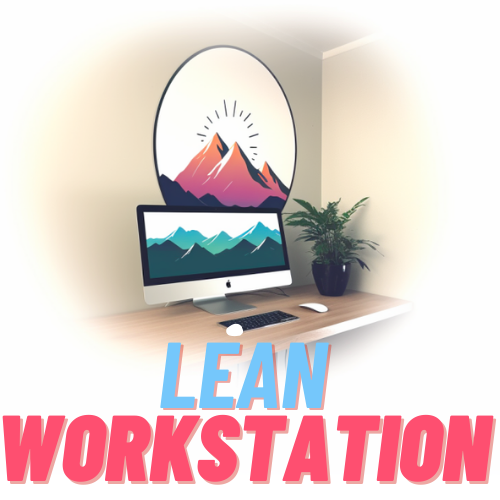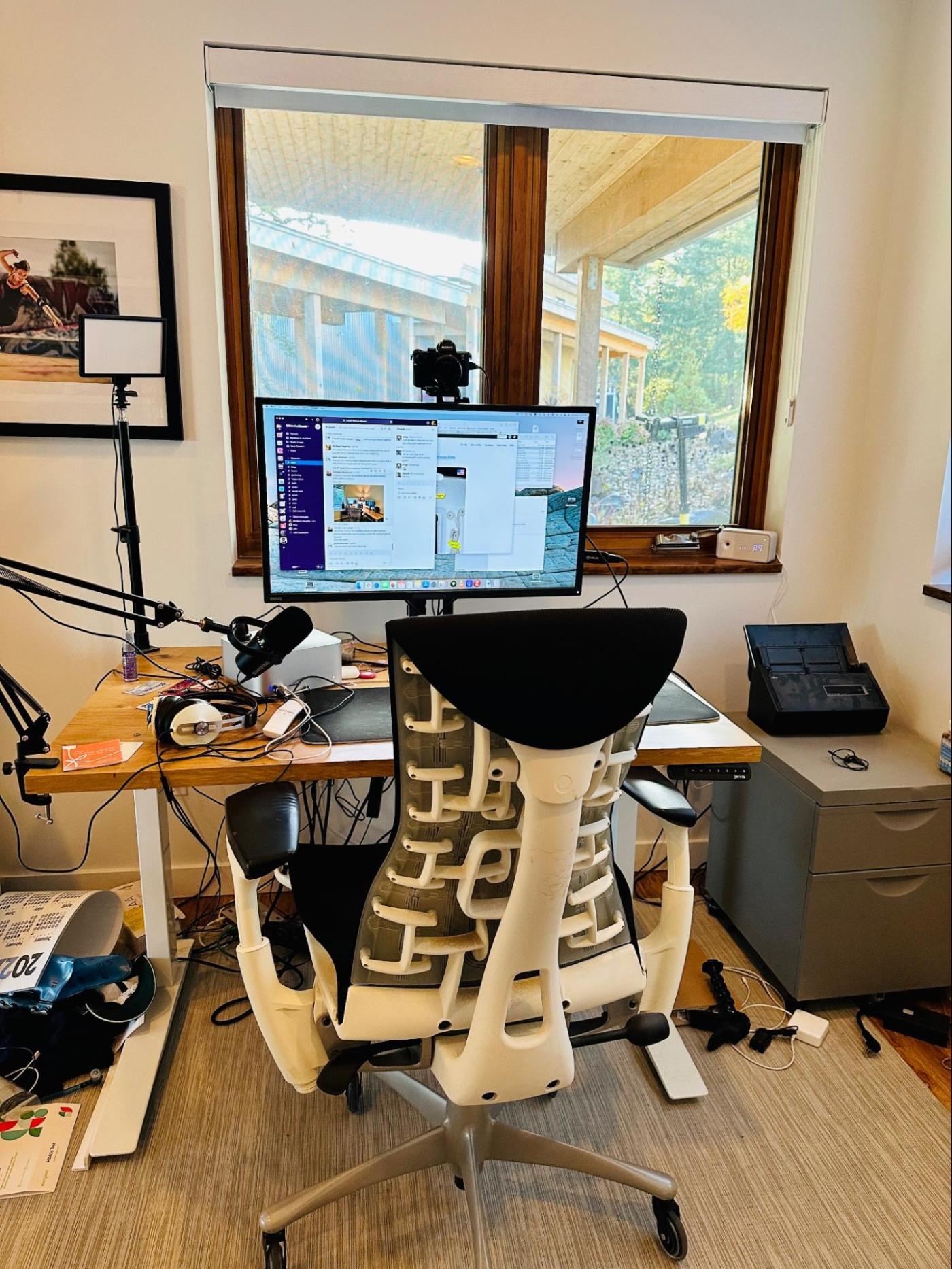
In this article, you will learn some helpful tips and tricks on how to transform your cluttered office into a minimalist one. It can be overwhelming and stressful to work in a cluttered space, so by implementing some simple changes, you can create a more organized and calming environment.
The first step to transforming your cluttered office is to declutter and get rid of any unnecessary items. Start by going through your desk and getting rid of any old papers, office supplies, or items that you no longer need or use. Organize your desk drawers and eliminate any excess clutter. Once you have decluttered your desk, move on to the rest of the office, taking the same approach and removing any unnecessary items. By clearing out the physical clutter, you will immediately feel a sense of calm and productivity in your workspace. If you find yourself asking this question, you’re not alone. Many people struggle with maintaining a clean and organized workspace, especially in today’s fast-paced and cluttered world. However, with a few simple strategies and a commitment to change, you can transform your cluttered office into a minimalist haven.
Assessing the Current State
Identifying Cluttered Areas
The first step in transforming your office into a minimalist space is to assess the current state of your workspace. Take a few minutes to look around and identify the areas that are cluttered and disorganized. These may include your desk, bookshelves, storage cabinets, and any other spaces where items tend to pile up.
Analyzing Workflows
Once you have identified the cluttered areas, take some time to analyze your workflows. Consider how you use your office space and whether it is optimized for efficiency. Are there any unnecessary items or equipment that are taking up valuable space? This analysis will help you determine what needs to be decluttered and what needs to be rearranged or removed altogether.
Examining Storage Solutions
Another aspect to consider when assessing your cluttered office is the storage solutions you currently have in place. Are your storage cabinets and shelves being used effectively? Are there any tools or systems that could help you better organize your belongings? By examining your current storage solutions, you can identify any areas for improvement and determine which storage methods will work best for your needs.
Decluttering Strategies
Developing a Sorting System
To begin the decluttering process, it is important to develop a sorting system. Create three categories: keep, donate or sell, and throw away. As you go through each item in your office, ask yourself if you truly need it or if it brings you joy. If not, place it in one of the other categories. This sorting system will help you declutter your space and make the decision-making process easier.
Organizing Essentials vs Non-Essentials
As you sort through your belongings, it is essential to distinguish between essential and non-essential items. Essential items are those that you need on a regular basis, while non-essential items are those that are rarely used or can easily be replaced. By organizing your essentials separately from non-essentials, you can prioritize the items that are most important to your work and simplify your office space.
Implementing the KonMari Method
One popular method for decluttering and organizing is the KonMari method, developed by Marie Kondo. The KonMari method encourages individuals to keep only items that spark joy and let go of the rest. By applying this method to your office, you can create a space that is both functional and aesthetically pleasing. Take the time to go through each item and discard anything that no longer brings you joy or serves a purpose.
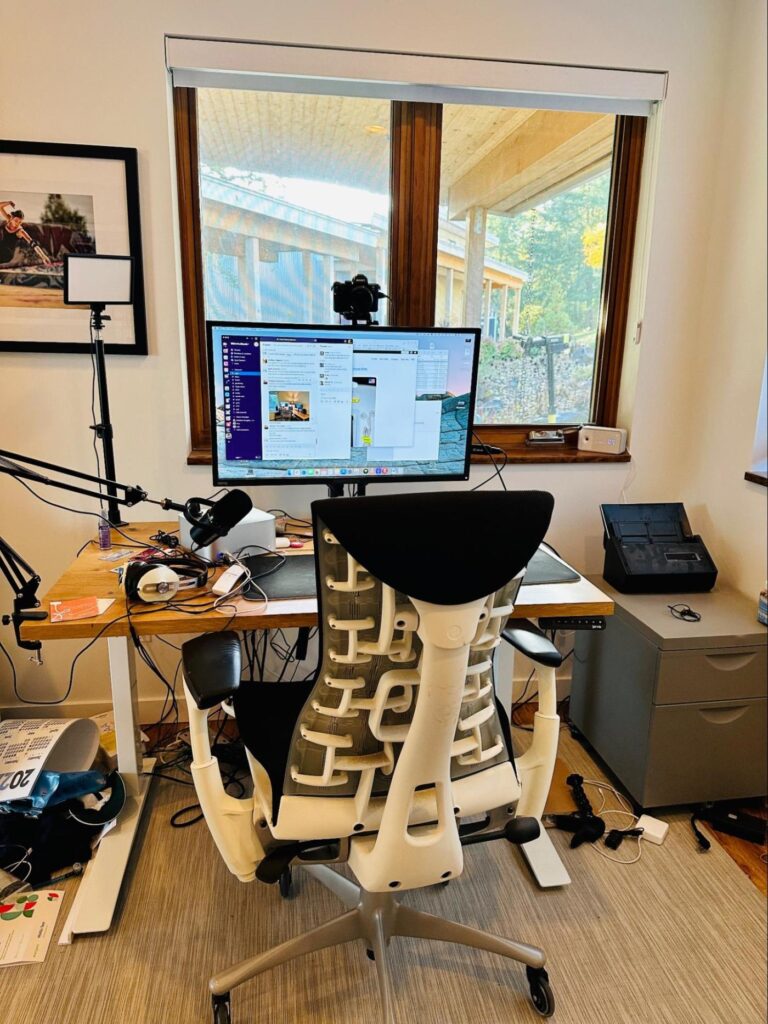
Optimizing Workspace Layout
Creating a Functional Floor Plan
After decluttering your office, it’s time to optimize the layout of your workspace. Start by creating a functional floor plan that allows for easy movement and access to essential items. Consider the placement of your desk, chairs, and other furniture to maximize the available space and create a more efficient workflow.
Maximizing Natural Lighting
In addition to the layout, the lighting in your office can greatly impact the overall feel of the space. Maximizing natural lighting can create a brighter and more inviting atmosphere. Consider placing your desk near a window or using sheer curtains to allow natural light to fill the room. This will not only make your office feel more spacious but also positively impact your mood and productivity.
Enhancing Ergonomics
Another important aspect of optimizing your workspace is considering ergonomics. Ensure that your desk and chair are positioned at the correct height to promote proper posture and reduce the risk of injury. Invest in an ergonomic chair and keyboard if necessary. By prioritizing ergonomics, you can create a comfortable and healthy working environment.
Choosing Minimalist Furniture
Prioritizing Functionality and Simplicity
When selecting furniture for your minimalist office, prioritize functionality and simplicity. Choose pieces that serve a purpose and have sufficient storage or organizational features. Opt for clean lines and minimalistic designs that will enhance the overall aesthetic of your office. Avoid furniture with excessive decorations or unnecessary details.
Exploring Space-Saving Options
In a small or cluttered office, it is essential to explore space-saving furniture options. Look for desks with built-in storage or shelves, as well as filing cabinets that can double as side tables. Consider wall-mounted shelves or floating desks to maximize vertical space. By utilizing space-saving furniture, you can make the most of your available space and keep your office clutter-free.
Integrating Multifunctional Pieces
Multifunctional furniture is a great way to optimize your minimalist office. Look for pieces that can serve multiple purposes, such as a storage ottoman or a desk that can be converted into a standing desk. By integrating multifunctional furniture into your workspace, you can minimize the number of items you need while still maintaining functionality.
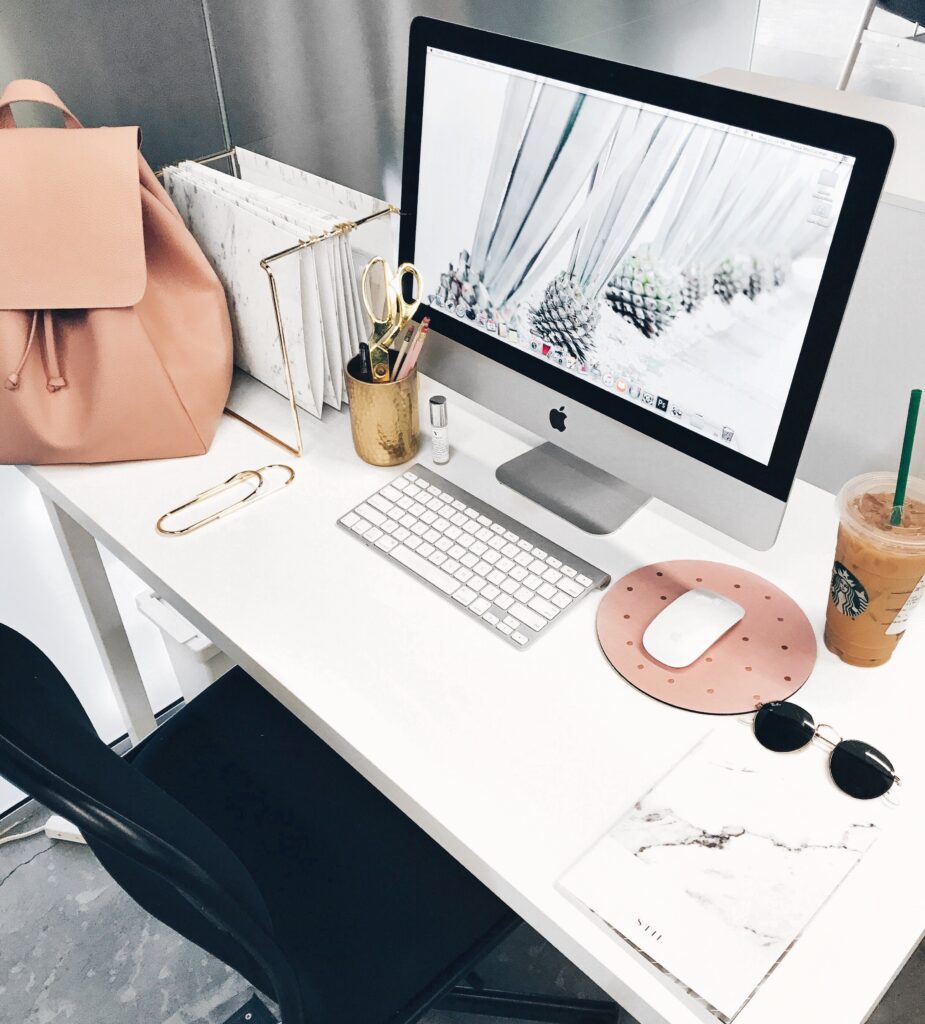
Streamlining Digital Systems
Organizing Digital Files
In today’s digital age, it’s important to streamline your digital systems as well as your physical workspace. Take the time to organize your digital files and folders, creating a logical and easy-to-navigate system. Utilize folders and subfolders to categorize your files and keep them organized. Implement naming conventions that make it easy to search for specific documents.
Adopting Cloud Storage Solutions
To further streamline your digital systems, consider adopting cloud storage solutions. Cloud storage allows you to access your files from anywhere and ensures that your important documents are safely backed up. Services like Dropbox, Google Drive, and Microsoft OneDrive offer convenient and secure cloud storage options.
Minimizing Desktop Clutter
Just as physical clutter can hinder productivity, a cluttered desktop can be equally distracting. Take the time to declutter your computer desktop, removing any unnecessary icons or files. Optimize your taskbar by pinning the most frequently used programs, and organize your email inbox to minimize clutter. By minimizing desktop clutter, you can create a digital workspace that is clean and organized.
Implementing Effective Storage Solutions
Utilizing Vertical Space
When it comes to storage solutions, don’t neglect vertical space. Installing shelves or bookcases on empty walls can provide ample storage space without taking up valuable floor space. Utilize hanging organizers or hooks to store frequently used items such as headphones or bags. By utilizing vertical space, you can maximize storage capacity and keep your office organized.
Investing in Adequate Shelving
Investing in adequate shelving is an essential part of creating a minimalist office. Choose sturdy and well-designed shelves that match the aesthetic of your workspace. Consider open shelving for displaying items you want to keep in sight, and closed cabinets for storing items that you don’t want to be visible. Proper shelving ensures that everything has its place and makes it easier to keep your office clutter-free.
Using Decorative Storage Containers
To maintain a minimalist aesthetic while still having storage options, incorporate decorative storage containers into your office. Choose containers that not only serve a purpose but also add to the overall look of your workspace. Look for stylish baskets, boxes, or trays that can be used to store items such as papers, pens, or other office supplies. By using decorative storage containers, you can keep your office organized while adding a touch of personality to the space.

Curating a Minimalist Color Palette
Choosing a Neutral Base
A minimalist office is often characterized by a neutral color palette. Choose a neutral base color, such as white, beige, or gray, for your walls and furniture. This will create a clean and calming backdrop for your workspace and allow other elements to stand out.
Adding pops of Color with Accent Pieces
While a neutral base is essential for a minimalist office, you can still add pops of color with accent pieces. Choose a few strategic objects, such as throw pillows, artwork, or desk accessories, in bold or vibrant colors to add personality to your space. These small touches of color will create visual interest without overwhelming the overall minimalistic aesthetic.
Creating a Harmonious Atmosphere
When curating a minimalist color palette, it’s important to create a harmonious atmosphere. Choose colors that complement each other and create a sense of balance. Avoid using too many contrasting colors or patterns as this can disrupt the minimalist aesthetic. By creating a harmonious color palette, you can achieve a cohesive and peaceful environment.
Maintaining a Paperless Environment
Digitizing Documents
One effective way to maintain a minimalist office is by embracing a paperless environment. Invest in a scanner or use mobile scanning apps to digitize important documents. Store them in organized digital folders instead of keeping physical copies. By digitizing your documents, you can reduce paper clutter and easily access important information whenever you need it.
Utilizing Digital Note-Taking Apps
Instead of using physical notebooks and sticky notes, consider utilizing digital note-taking apps. There are numerous apps available that allow you to create and organize digital notes, such as Evernote, Microsoft OneNote, or Google Keep. These apps enable you to keep track of your thoughts, tasks, and ideas without the need for physical paper.
Eliminating Unnecessary Printouts
Another way to maintain a paperless environment is by eliminating unnecessary printouts. Before hitting the print button, ask yourself if the document can be saved digitally instead. By reducing your reliance on paper printouts, you can minimize clutter and contribute to a more eco-friendly workspace.
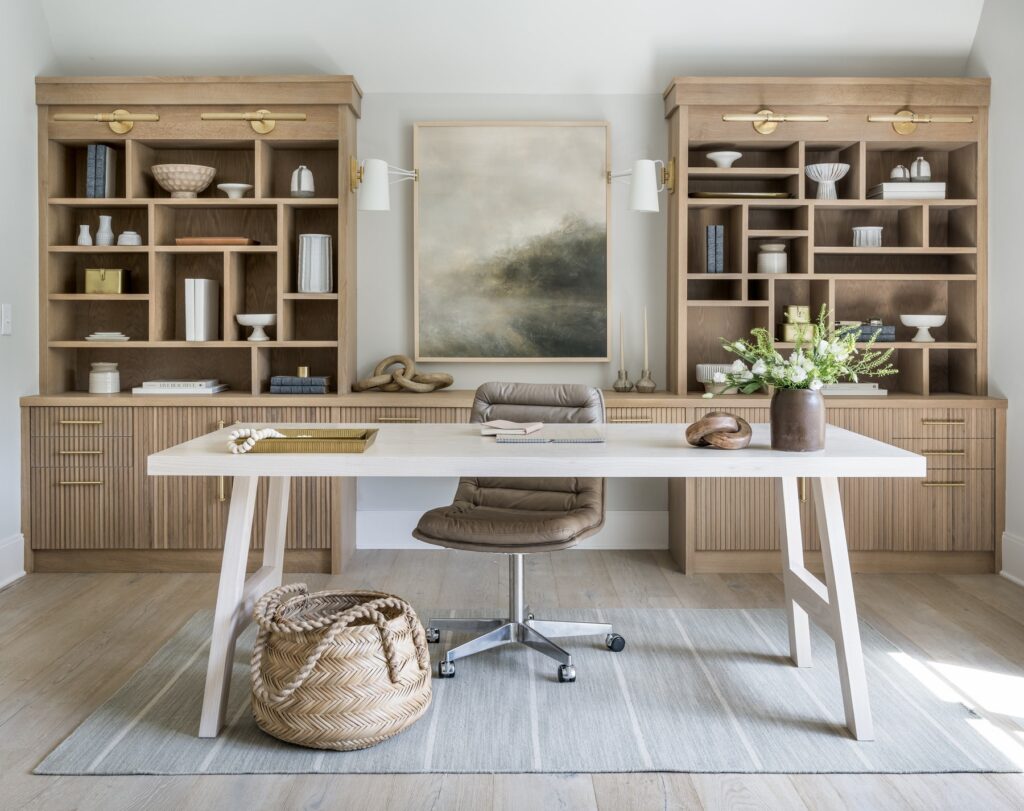
Incorporating Inspiring Decor
Displaying Motivational Quotes
In a minimalist office, inspirational and motivational quotes can serve as visual reminders of your goals and aspirations. Display your favorite quotes in frames or on a bulletin board. Choose motivational phrases that resonate with you and reflect your values. These quotes will not only inspire you but also add a personal touch to your workspace.
Introducing Indoor Plants
Indoor plants can bring life and freshness to your minimalist office. Choose low-maintenance plants that thrive indoors, such as succulents or peace lilies. Place them strategically around your workspace to add a touch of greenery and promote a sense of calm and tranquility. Indoor plants not only enhance the aesthetics of your office but also improve air quality and promote well-being.
Incorporating Mindful Art
Mindful art, such as calming landscapes or abstract pieces, can contribute to a peaceful and serene environment. Choose art that resonates with you and creates a sense of tranquility. Avoid cluttering your walls with too many artworks and opt for larger, statement pieces instead. By incorporating mindful art into your minimalist office, you can create a visually appealing and mentally stimulating space.
Conclusion
Transforming your cluttered office into a minimalist one may seem like a daunting task, but with determination and the right strategies, it is achievable. By assessing the current state of your office, decluttering your space, optimizing the layout, and implementing effective storage solutions, you can create a minimalist workspace that promotes productivity and peace of mind. Remember, the key is to prioritize simplicity, functionality, and organization. So, take the first step and start transforming your cluttered office into a minimalist haven today.

